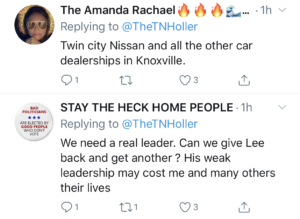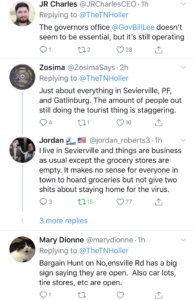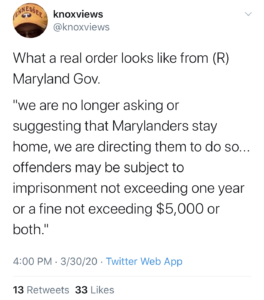WE ASKED, YOU ANSWERED: “ESSENTIAL BUSINESSES” STILL OPEN? (FOLLERER RESPONSES)
Governor Lee has NOT issued a shelter-in-place order despite the pleas of medical professionals. Instead he is “urging” folks to stay home while ordering “essential businesses” closed.
The catch? His order includes a laundry list of “essential businesses” that basically lets everyone off the hook.
Lee also believes enforcement isn’t necessary because he’s sure everyone will just comply.

We asked y’all to tell us which local businesses that clearly are not “essential” are still open. Many of these could make use of some kind of system to help them at the very least work remotely for the time being, to help keep them and their families safe. Systems do exist for this, after all (like the https://www.filecenterdms.com/kb-how-do-i-scan-a-large-document-in-pieces.html page shows), so it should be feasible for many examples.
As a result of the covid-19 pandemic, many businesses big or small, have made the decision to work from home until it passes. Not only will this help them to remain safe, but it also means that the business can still operate during this time. In some areas, working from home has increased productivity as well as lead generation. It has given many businesses the chance to rethink their strategies and make better marketing content like those discussed in this article about how to build a lead generation website.
However, when it comes to working from home, employees can be more at risk of experiencing a cyber attack. But with the help of this Cyber Security Threats in 2020 article, employers can establish what the potential risks are, and how they can be avoided. This will be very important, as no one knows how long they will be required to work from home. Some businesses are waiting to reopen and should be prepared with COVID signs to print for a restaurant, offices, and other facilities to help keep employees and customers safe and aware. Whilst most businesses are doing this, many are still opening when they shouldn’t be, as some fall outside of the standard office work. Below are some of your responses.
FOLLERER RESPONSES:
Pollock Printing in NASHVILLE
Lowe’s in CLARKSVILLE has remained open with ineffective disinfection material and continue to schedule a woman who has cancer! I’m immunocompromised so everytime my roommate goes home from work, I’m in danger.
American Greetings – Greeting cards are not essential
Hobby Lobby in GREENEVILLE is open. Not sure if other locations are or not.
The damn Bass Pro Shop in East Ridge, TN (part of CHATTANOOGA) is still open. Why are decoys, guns, or deer bait necessities right now??!
Hobby Lobby Kingsport TN
Just about everything in Sevierville, PF, and Gatlinburg. The amount of people out still doing the tourist thing is staggering.
Jostens in CLARKSVILLE. They are forcing the entire plant to work 6 days a week and you get points even if you are sick. Around 400 employees. They make yearbooks. Not essential at all.
Whirlpool in CLEVELAND is still operating on full shifts. They employ over 1000 people who all work in close quarters. That plant manufactures stoves and microwaves. I seriously doubt that those particular items are ‘essential’ during this health crisis.
US SMOKELESS TOBACCO Closed down, forcing folks back April 1st, Located At 800 Harrison St NASHVILLE, Be The Judge Of The Necessity,Have A Great Day…!!!!
Knoxville Wholesale Furniture is still operating.
(Also: Knoxville Wholesale Furniture is still open. The owner had a fund raiser at his home on February 23 for Moscow Mitch. $10,000 donors. Marsha Blackburn attended. Owner says they are essential because they do deliveries.)
Books-a-Million in MT. JULIET and MURFREESBORO are still somehow open! I don’t get it. Friends that work there are flabbergasted. I mean, it’s a BOOKSTORE in a PANDEMIC!
grooming shop in CHURCH HILL. Groomers corner. The husband of the owner just called the county mayor of hawkins county and they told them they can stay open Also I called my regional health department in Sullivan county bc there is one I know for sure is open in BLUFF CITY and the man I spoke to told me that (paraphrasing here) since they don’t provide vet services they are considered non-essential but since there is no official mandate they are leaving it to the goodwill of the people to shut down.
RESOLUTE FOREST PRODUCTS, formerly Bowater in CALHOUN
The Whistle Stop in GREENEVILLE still had dine-in as of last week. I haven’t checked this week. It is across the street from Tusculum University where 5 students tested positive.
Also, John Deere in GREENEVILLE, they only make lawn mowers at that plant, so I don’t really understand what makes them essential. I could see it if they were making tractors here. Most of the drive through employees I’ve seen do not have gloves, mask (understandable with the shortage I guess).
Also, in Pal’s GREENEVILLE which is my kids favorite place is too small for the employees to work 6 feet apart. Most of this town is just acting like everything is normal.
The Hookah Hookup has still remained open (it is closed the next few days for inventory and the owner considers it an essential business because we carry snacks. I’ve called the health department and mayors office multiple times and no one can do anything! A smoke shop is not an essential business
Bedrugs factory on Myatt Drive in Davidson Co. – They are open, making Bedrugs for pick up trucks…. Owned BY Truck Hero in Michigan
Tmobile Call Center on 695 Grassmere Park NASHVILLE is still open
I live in GREENE COUNTY. Most if not all factories are refusing to shut down. They’re claiming to be an essential business. That they make something used by hospitals, which IMO, isn’t true for most if not all of them. We’re up to 14 confirmed cases of the virus. It’s climbing every day. They are putting their employees and their families at risk. I’m afraid it could already be too late, but hopefully I’m wrong. Thank you for all that you do to keep us informed. It is very appreciated.
hey, both Simply Mac locations are still operating and they’re absolutely not essential businesses. I have 2 friends who work there who are both high risk for COVID-19. Simply Mac is just trying to slide under the radar and actually laid off most of their employees. Ive tried calling the mayor’s office but I doubt that did anything. there are two locations in NASHVILLE. One in the same plaza as the Vanderbilt Barnes & Noble, and one in the Wedgewood Houston area. the store manager for those locations is NOT responsible for the call to stay open, she’s tried very hard to push for them to close. The corporate offices for Simply Mac are located in Salt Lake City, Utah
Bass Pro is not essential. They had someone that worked there that tested positive and closed per the mayor’s order to shut down businesses. They found a loophole and reopened three days later stating that no one can shut down a place that sells guns other than the federal government. They are not requiring customers stay 6 ft apart. No extra cleaning. Essential employees can only take off if they get the virus or they can quit. Complete disregard for their employees or the public. Only concerned about money.
Here were some twitter responses:




IF YOU HAVE ANYONE YOU WANT TO ADD TO (OR SUBTRACT FROM) THIS LIST, Holler at us: thetnholler@gmail.com



